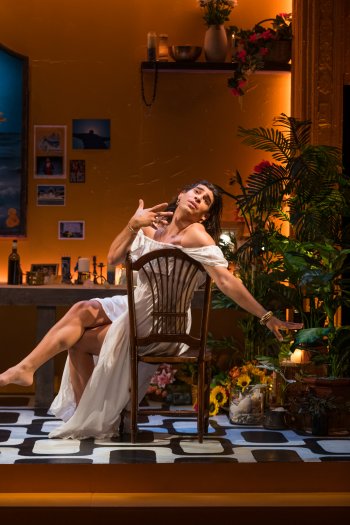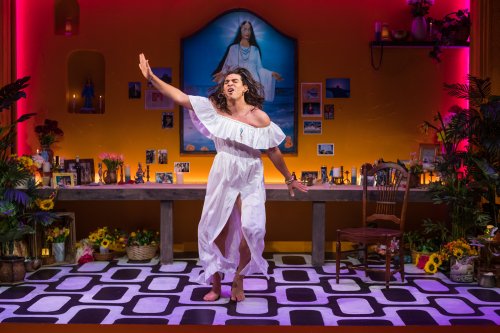Ni Mi Madre
A tribute and an exorcism of the performer/writer’s mother, an indomitable Brazilian woman, sassy, quick-witted and opinionated.

Arturo Luís Soria in his “Ni Mi Madre” at Rattlestick Playwrights Theater (Photo credit: Arturo Luís Soria)
[avatar user=”Victor Gluck” size=”96″ align=”left”] Victor Gluck, Editor-in-Chief[/avatar]
Arturo Luís Soria’s Ni Mi Madre is a tribute and an exorcism of the performer/writer’s mother, an indomitable Brazilian woman, sassy, quick-witted and opinionated. It is also the story of her relationship with her mother in Ipanema, Rio, and that of her son Arturo, in Miami, Florida. This one- person show is over-the-top, entertaining, and enlightening telling of a free-spirit who lived her life exactly as she wanted to and of how she inspired her children to also live their lives to the fullest. We also learn about how Latin men treat their wives and sons.
As his mother Bete (pronounced Bet–chi), Soria is bigger than life without a great deal of assistance from props, costuming or make-up. When he enters carrying an offering to the stage which is set up like a tropical altar to Iemanja, the Afro-Cuban diety whose picture is on the wall center stage, he is wearing a white linen skirt which he suddenly pulls up and it becomes his mother’s dress (designed by Haydee Zelideth). In English punctuated with pungent Spanish and Portuguese, sometime translated, often as not left unexplained, Bete tells us of her three marriages, each one unfulfilling, and of her children, her difficult son Arturo who from a young age wanted to dance ballet and was always getting into trouble, and his sister who always liked sports. We learn of her unconventional child rearing practices which was as much a tug of war with her children as it was a series of lessons in living, and marked Arturo for life.
Bete tells us of her own Brazilian childhood in Ipanema, where growing up poor she mingled with the very wealthy, and of her mother who was always trying to get rid of her, first to a boarding school and then to relatives in Italy. We hear of her most cherished movies and snatches of her favorite songs, from Gloria Estefan, Cher and Maria Bethânia. We learn of her idols who helped make her what she became: Meryl Streep, Madonna. She also speaks of her theories of sex and the relations between men and women.

Arturo Luís Soria in his “Ni Mi Madre” at Rattlestick Playwrights Theater (Photo credit: Arturo Luís Soria)
Directed by Danilo Gambini, Soria’s performance is always convincing, always exuberant, always commanding. Never for a moment does the persona slip. Whether dancing, singing, declaiming, or storytelling, Soria remains Bete even when playing her mother or himself. We feel the pain that she causes her son but also the vivacious spirit that was always in evidence. He may have been damaged by her but he never forgot her or the lessons she taught. If Ni Mi Madre has any flaw, it is that it is too much of a piece without any variety, though Soria’s energy and humor never palls.
The atmospheric setting by Stephanie Osin Cohen sports a black and white flooring that suggests Ipanema sidewalks, and an altar with pictures, photographs, candles, palm trees and brightly colored flowers, along with a yellow-orange back wall like a tropical sunset. Krista Smith’s lighting changes colors as it plays upon the set to mark the shifts in time and setting. The sound design by Kathy Ruvuna contains songs and music that Bete often refers to as well as for mood and atmosphere. The production now offers Spanish and Portuguese translations, as well as ASL interpretation for all performances until the end of the New York run.
Ni Mi Madre (streaming online and in person extended through September 25, 2021)
Rattlestick Playwrights Theater, 224 Waverly Place, in Manhattan
For tickets, call 212-627-2558 or visit http://www.rattlestick.org
Running time: one hour without an intermission
Note: Besides proof of vaccination, ID and masks, the bathrooms are unavailable to audience members.






Leave a comment